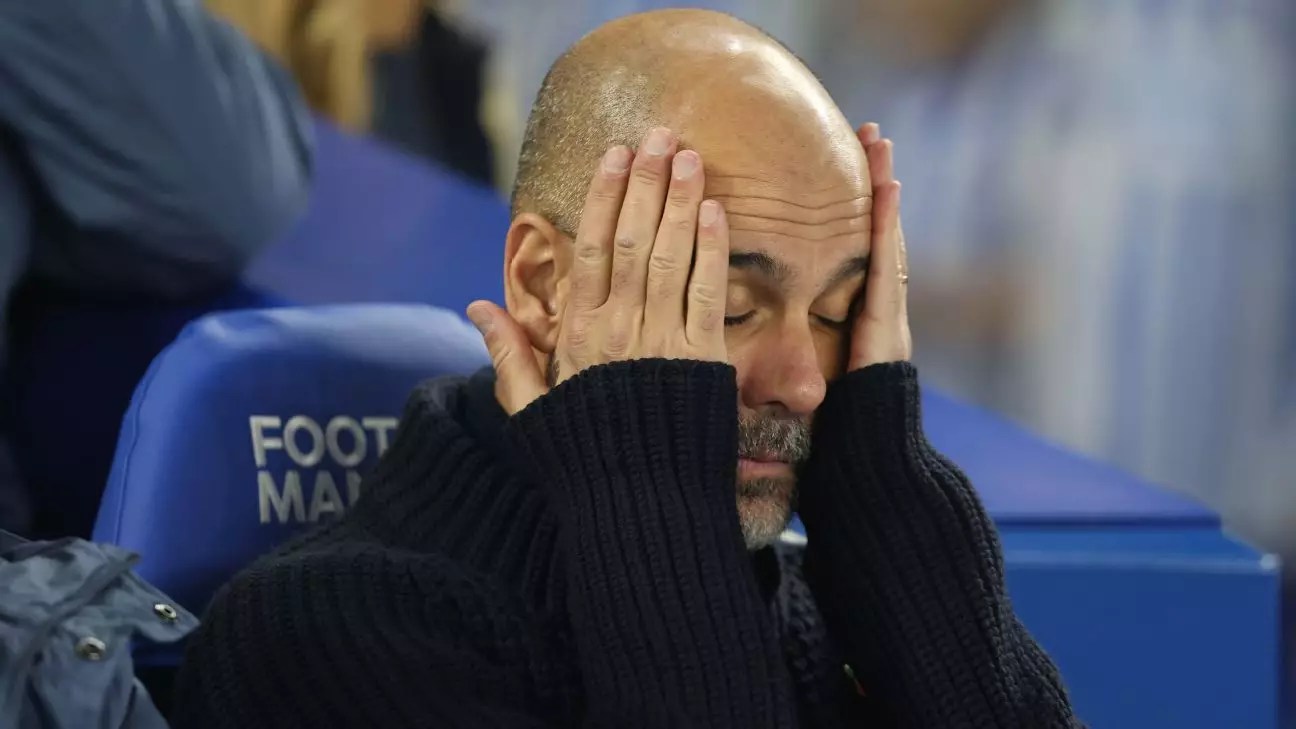Pep Guardiola, a figure synonymous with success in modern football, is grappling with a challenging reality at Manchester City. Once regarded as the architect of dominance in the Premier League, he now faces a situation that is decidedly uncharted for the 53-year-old manager. Recent performances have raised eyebrows and ignited discussions about the stability of Guardiola’s reign at the Etihad Stadium—a venue previously celebrated for its glory. A shocking 2-1 defeat to Brighton marked Guardiola’s fourth consecutive loss, a feat he had never experienced in his storied career dating back to his beginnings at Barcelona in 2008. This downturn, unprecedented in its frequency, has evoked concerns that City could be tumbling into unfamiliar territory.
While it may be tempting to dismiss these losses as mere bumps in the road, the cumulative nature of City’s struggles cannot be overlooked. The defeats to Tottenham, Bournemouth, Sporting CP, and Brighton have not only dimmed their aspirations this season but echoed the woes preceding things that once seemed invulnerable. Guardiola himself acknowledged the whispers of an “end of an era,” reflecting the inevitable discussion that arises as success wanes. Yet, amidst this turmoil, he remains staunch in his belief that the narrative of decline can often be exaggerated. As he stated in a post-match press conference, “If somebody would like to beat us, it is going to happen.” This awareness of invincibility being a fleeting concept is sobering.
In addition to on-field issues, City is also wrestling with significant off-field challenges. The club is embroiled in an ongoing battle against the Premier League’s 115 charges regarding financial misconduct. Despite vehement denials from City, this shadow looms large, casting doubts on the club’s capacity to attract new talents. Questions arise around the potential consequences—ranging from hefty fines to a possible expulsion from the Premier League—that deter star players from considering a move to the Etihad. The resignation of Txiki Begiristain, the club’s director of football, further complicates matters, as Guardiola’s long-term future with City hangs in the balance amid speculation.
Injuries Compounding Woes: A Squad in Crisis
Compounding these difficulties is an injury crisis that has thinned Guardiola’s ranks. Rodri’s season-ending injury has jolted the team, although City initially appeared resilient enough to adapt, winning six of their next seven games without him. Still, the absence of key figures such as Kevin De Bruyne, John Stones, and Ruben Dias has created a tangible gap in quality. Rodri has been a backbone for the side, and his statistics bear this out: with him, City’s win rate hovers around 73.6%, but that figure plummets to 58.3% in his absence. When the spine of a team falters—especially in a league as unforgiving as the Premier League—it’s challenging to maintain consistency.
A wider issue is at play as well: the aging squad under Guardiola’s management. Key players like De Bruyne (33) and Walker (34) are eclipsing their prime years, marking an impending transition that City must confront. History has shown that teams failing to plan for such transitions often stumble into decline; Manchester United’s struggles post-Sir Alex Ferguson’s era serve as a cautionary tale. The young talents within the squad, such as Rico Lewis and Jahmai Simpson-Pusey, are promising but insufficient to mask the impact of losing seasoned performers.
Resilience Yet to Be Proven
Despite these myriad challenges, writing off Guardiola’s City seems premature. The often unpredictable nature of football means form can shift dramatically. Just five points separate them from current league leaders Liverpool, positioning City well within reach of success if the pieces fall into place. Guardiola’s belief remains steadfast; he has echoed confidence in his squad, stating that “when the players come back, I don’t have any doubt that we will be back to our best.” However, one wonders if this conviction is as much for external reassurance as it is for internal morale.
Guardiola’s current predicament is a complex weave of on-field performance and off-field challenges. The next few months will be crucial for Manchester City as they flirt with both crisis and the potential for resurgence. Guardiola has undeniably transformed the football landscape during his tenure, but the mark of a truly great manager lies not just in moments of glory but in the ability to navigate adversity. How he leads his team through this period of uncertainty could define both his legacy at this historic club and the future of Manchester City.


Leave a Reply